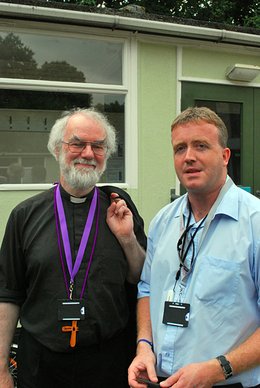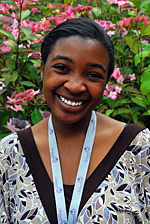Youth Representation on the Archbishops' Council
 The Archbishop with Robin Rolls, Director of Youth Ministry
The Archbishop with Robin Rolls, Director of Youth MinistryTuesday 22nd July 2008
The Youth Council of the Diocese of Leicester visit the Archbishop at the Lambeth Conference.The Archbishop of Canterbury Dr Rowan Williams today promised to begin the process to have youth representation on the Archbishops' Council.
Dr Williams was responding to a challenge from young people who were reporting from last week's "The Lambeth Talk", an international youth event in the Diocese of Leicester. The event brought young Anglicans from all of the world to discuss their experiences as young people in the Church and in the world.
While the room might have been stuffy, the atmosphere wasn't as the Chair Matt Rusk and Vice Chair Becky Jackson of the Youth Council of the Diocese of Leicester explained how their Diocese was making a fundamental shift to make a place for them.
The Diocese of Leicester, under Bishop Tim Stevens, has allocated a significant amount of its budget to employing youth workers, and has set up a Youth Council which meets with the Bishop every two months, and is given a voice at the diocesan synod. Its purpose is not simply to meet the needs of young people but to incorporate them and their ideas into every area of church life.
"Bishop Tim puts his heart and soul in and listens to what we want to do," Miss Jackson said. "Without his support a lot of what we try to do wouldn't be possible."
Both Miss Jackson and Mr Rusk asked Dr Williams to consider whether a similar model of engagement with young people could be adopted on a national scale, with the Archbishops of Canterbury and York meeting at least once a year with members of the Church of England Youth Council, and youth representation on the Archbishops' Council.
"I'm going to step up to the plate and say yes to the both of those challenges," Dr Williams said, when all bishops present were asked to make a pledge to do one thing to make a difference to youth in their area of responsibility, "To meeting the Youth Council in the next twelve months, and starting the ball rolling on youth representation on the Archbishops' Council."
Pledges from other bishops included a commitment to have youth representation on all diocesan committees, and a promise to implement the recommendations of a report into the needs of youth in a diocese.
"We need you to lead us"
There are many active young Anglicans, but they face challenges to their commitment to the church.
"The first thing I felt in my parish church was that I was the only person my age. I love the old people, they're really cool, but it's also quite lonely and I feel in a minority," said Miss Jackson.
And when you're a minority, it's hard to change things, said Mr Rusk.
"You're not always regarded as an important part of the church, but in fact the youth are the future of the church," he said.
 During the session, participants from The Lambeth Walk, including Millie Dewasi from Tanzania, took the attending bishops through games to illustrate issues that face Anglican youth around the world. In one game, Miss Dewasi invited a volunteer, Suffragan Bishop of Aipo Rongo, Denys Ririka, to engage in a life-sized, blindfolded game of snakes and ladders, where he was led by two young people around a "board" of life events that took him backwards or forwards.
During the session, participants from The Lambeth Walk, including Millie Dewasi from Tanzania, took the attending bishops through games to illustrate issues that face Anglican youth around the world. In one game, Miss Dewasi invited a volunteer, Suffragan Bishop of Aipo Rongo, Denys Ririka, to engage in a life-sized, blindfolded game of snakes and ladders, where he was led by two young people around a "board" of life events that took him backwards or forwards.
"How does it feel when to be led blindfolded?" Miss Dewasi asked the bishop.
"I feel safe when you are leading me," he replied.
"That is how young people feel in the church," Miss Dewasi said. "You need to lead us."
